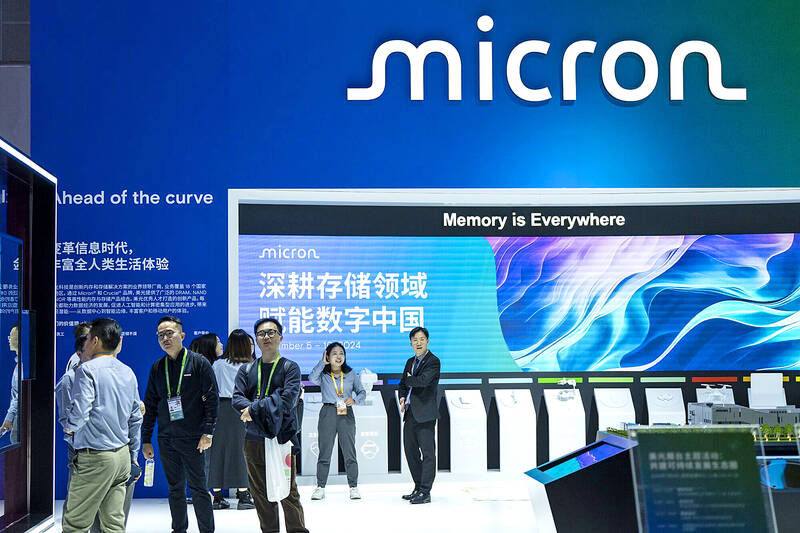US President Joe Biden’s administration yesterday finalized up to US$6.2 billion in funding for Micron Technology Inc, firming up a deal to boost domestic semiconductor production before Donald Trump returns to the White House.
The Biden administration has been working to green-light agreements with firms in the chipmaking supply chain over recent months, seeking to cement parts of his legacy before the government administration changes.
Once a deal is finalized, funds can start heading to companies when they hit certain milestones.

Photo: Qilai Shen, Bloomberg
The Micron investment helps to bring development and production of advanced memory semiconductor technology to US shores, US Secretary of Commerce Gina Raimondo said.
This “is crucial for safeguarding our leadership on artificial intelligence and protecting our economic and national security,” she added in a statement.
The United States has been trying to reduce its dependence on China and other countries for semiconductors.
The latest funding comes under the CHIPS and Science Act, a major law passed during Biden’s term aimed at strengthening the US semiconductor industry.
The Micron deal in particular supports the company’s two-decade plan to invest some US$100 billion in New York and US$25 billion in Idaho, the US Department of Commerce said.
This should create some 20,000 jobs and “help the US grow its share of advanced memory manufacturing from less than two percent today to approximately 10 percent by 2035,” the department added.
Apart from the efforts in New York and Idaho, the commerce department also signed a preliminary agreement with Micron for up to US$275 million in proposed funding to expand and modernize its facility in Virginia.
“As the only US-based manufacturer of memory, Micron is uniquely positioned to bring leading-edge memory manufacturing to the US,” Micron president Sanjay Mehrotra said in a statement.
The US used to make nearly 40 percent of the world’s chips but this proportion is now around 10 percent, with none being the most advanced chips.

KEEPING UP: The acquisition of a cleanroom in Taiwan would enable Micron to increase production in a market where demand continues to outpace supply, a Micron official said Micron Technology Inc has signed a letter of intent to buy a fabrication site in Taiwan from Powerchip Semiconductor Manufacturing Corp (力積電) for US$1.8 billion to expand its production of memory chips. Micron would take control of the P5 site in Miaoli County’s Tongluo Township (銅鑼) and plans to ramp up DRAM production in phases after the transaction closes in the second quarter, the company said in a statement on Saturday. The acquisition includes an existing 12 inch fab cleanroom of 27,871m2 and would further position Micron to address growing global demand for memory solutions, the company said. Micron expects the transaction to

Vincent Wei led fellow Singaporean farmers around an empty Malaysian plot, laying out plans for a greenhouse and rows of leafy vegetables. What he pitched was not just space for crops, but a lifeline for growers struggling to make ends meet in a city-state with high prices and little vacant land. The future agriculture hub is part of a joint special economic zone launched last year by the two neighbors, expected to cost US$123 million and produce 10,000 tonnes of fresh produce annually. It is attracting Singaporean farmers with promises of cheaper land, labor and energy just over the border.

US actor Matthew McConaughey has filed recordings of his image and voice with US patent authorities to protect them from unauthorized usage by artificial intelligence (AI) platforms, a representative said earlier this week. Several video clips and audio recordings were registered by the commercial arm of the Just Keep Livin’ Foundation, a non-profit created by the Oscar-winning actor and his wife, Camila, according to the US Patent and Trademark Office database. Many artists are increasingly concerned about the uncontrolled use of their image via generative AI since the rollout of ChatGPT and other AI-powered tools. Several US states have adopted

A proposed billionaires’ tax in California has ignited a political uproar in Silicon Valley, with tech titans threatening to leave the state while California Governor Gavin Newsom of the Democratic Party maneuvers to defeat a levy that he fears would lead to an exodus of wealth. A technology mecca, California has more billionaires than any other US state — a few hundred, by some estimates. About half its personal income tax revenue, a financial backbone in the nearly US$350 billion budget, comes from the top 1 percent of earners. A large healthcare union is attempting to place a proposal before